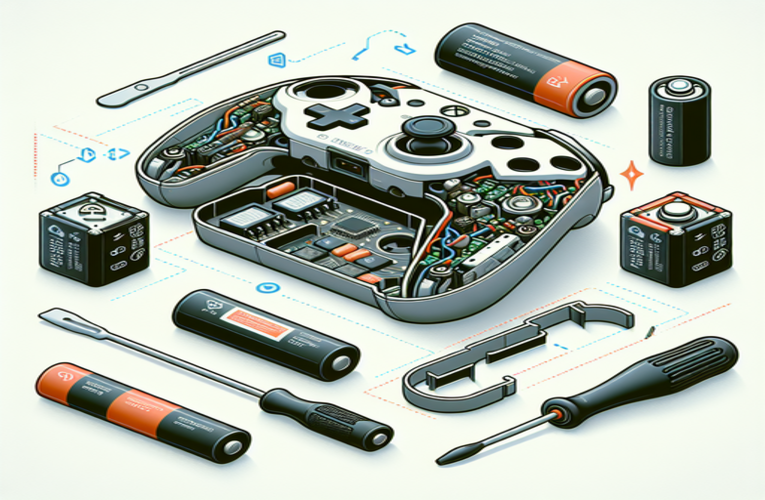Best Batteries for Meta Quest 2 Controllers: Top Choices for Long-Lasting Performance
Have you ever been in the middle of an exhilarating gaming session on your Meta Quest 2 headset, only to be interrupted by those dreaded low battery warnings on your controllers? It’s a common frustration among virtual reality enthusiasts, but the good news is that there’s a simple solution. Understanding what batteries the Meta Quest 2 controllers use can make a huge difference in your overall gaming experience. Whether you’re a casual player or someone who spends hours immersed in virtual worlds, choosing the right batteries—be it alkaline AA or rechargeable options—can help you avoid annoying interruptions and enjoy longer, more engaging gameplay. Let’s explore the best battery choices that will keep your Meta Quest 2 controllers running smoothly and efficiently, ensuring you stay fully immersed in your VR adventures without unnecessary downtime.
Key Topics
- Battery Types: Discover what kind of batteries Meta Quest 2 controllers use, including both alkaline and rechargeable AA options.
- Alkaline Batteries: Ideal for occasional gamers, offering convenience but requiring frequent replacements.
- Rechargeable Batteries: The best choice for frequent players, providing cost savings and extended playtime with rechargeable AA batteries.
- Battery Life Tips: Learn strategies to maximize battery life, such as turning off controllers during breaks and adjusting settings.
- Essential Accessories: Explore accessories like smart chargers and extra batteries to enhance your gaming setup and minimize downtime.
Whether you’re seeking a quick fix or a long-term solution, understanding the battery options for your Meta Quest 2 controllers is key to optimizing your gaming experience. Dive into the full article for in-depth insights that will help you make the best decision for your VR needs!
A Comprehensive Guide to Choosing Batteries for Your Meta Quest 2 Controllers
For an immersive and uninterrupted virtual reality experience with your Meta Quest 2, reliable controller power is essential. Selecting the appropriate batteries not only extends your gaming sessions but also enhances overall performance. Understanding the available options helps prevent unexpected interruptions and keeps you engaged in your virtual adventures.
Understanding Battery Options for Meta Quest 2 Controllers
The Meta Quest 2 controllers operate using standard AA batteries, offering flexibility between alkaline and rechargeable types. Your choice depends on gaming frequency and personal preferences.
Alkaline Batteries: Convenience for Occasional Gamers
Alkaline batteries are widely accessible and perfect for those who play sporadically. They require no setup—simply insert them, and you’re ready to dive into your VR experience. However, they have a limited lifespan and necessitate frequent replacements, which may lead to increased waste over time.
Rechargeable Batteries: Efficiency for Frequent Players
For dedicated gamers, rechargeable batteries are a sustainable and cost-effective choice. High-capacity nickel-metal hydride (NiMH) batteries offer longer playtime per charge and can be reused multiple times. This reduces environmental impact and provides consistent performance for extended gaming sessions.
Maximizing Battery Life for Optimal Performance
Enhance your gaming experience by adopting strategies to prolong battery life. Manually turning off controllers during breaks conserves energy, preventing unnecessary drain. Adjusting settings—such as reducing haptic feedback intensity—can significantly decrease power consumption without compromising gameplay quality. Proper storage of batteries in a cool, dry place also maintains their efficiency and extends their lifespan.
Enhancing Your Gaming Setup with Essential Accessories
Investing in quality accessories complements your battery choice and optimizes performance. Smart chargers with features like overcharge protection and individual charging slots ensure your rechargeable batteries remain in top condition. Keeping an extra set of charged batteries on hand allows for quick swaps, minimizing downtime and enhancing continuity during intense gaming sessions.
Making the Right Choice Based on Your Needs
Your gaming habits are the primary factor in selecting the suitable batteries:
- Occasional Gamers: If you engage in VR experiences infrequently, alkaline batteries offer simplicity and immediate usability.
- Frequent Gamers: For regular players, rechargeable batteries provide long-term savings and environmental benefits, making them a practical investment.
By choosing batteries that align with your usage patterns and implementing best practices for battery management, you ensure a seamless and enjoyable Meta Quest 2 experience. Stay powered up and fully immersed in your virtual reality adventures without the worry of unexpected power loss.
Summary
Selecting the appropriate batteries for your Meta Quest 2 controllers can greatly improve your virtual reality gaming experience by reducing interruptions and extending playtime. For avid VR gamers, choosing rechargeable batteries for Meta Quest 2 controllers not only offers cost savings in the long run but also supports environmental sustainability. On the other hand, alkaline batteries are ideal for casual Meta Quest 2 players seeking easy and convenient power solutions. By exploring various battery options for Meta Quest 2 controllers and adopting efficient battery management practices, you can ensure seamless and immersive experiences in your virtual reality adventures.
Questions and Answers
What benefits do rechargeable AA batteries offer compared to alkaline batteries for Meta Quest 2 controllers?
Using rechargeable AA batteries in Meta Quest 2 controllers offers substantial cost savings in the long run since they can be recharged and reused multiple times, eliminating the frequent need to purchase disposable alkaline batteries. Furthermore, rechargeable batteries are a more sustainable and eco-friendly choice, as they generate less environmental waste compared to single-use alkaline alternatives.
How can I determine when the batteries in my Meta Quest 2 controllers require replacement or recharging?
Signs that your Meta Quest 2 controller batteries need new power sources include receiving low battery notifications during gameplay, experiencing reduced performance such as delayed or unresponsive inputs, and noticing shorter play sessions before needing to recharge. Monitoring these indicators can help ensure optimal functionality of your controllers by timely replacing or recharging the AA rechargeable batteries.
What are the recommended best practices for storing rechargeable batteries for Meta Quest 2 controllers?
To maximize the lifespan and performance of rechargeable AA batteries for Meta Quest 2 controllers, store them in a cool, dry environment away from direct sunlight and extreme temperatures. Ideally, keep them at room temperature and partially charge the batteries prior to long-term storage. This practice helps preserve battery health and ensures they remain ready for use when needed.
Is it safe to use a mix of different AA battery brands in my Meta Quest 2 controllers?
Using a combination of different AA battery brands or types in your Meta Quest 2 controllers is not recommended, as it can result in uneven power supply and may increase the potential for battery leakage or malfunction. For optimal performance and safety, it’s best to use matching rechargeable AA batteries from the same manufacturer.
How can smart chargers improve the battery charging process for Meta Quest 2 controllers?
Smart chargers enhance the charging process for Meta Quest 2 controller batteries by providing advanced features such as overcharge protection, dedicated slots for individual AA rechargeable batteries, and fast charging options. These features help prolong the life of your rechargeable batteries, ensure they are charged efficiently, and prevent potential damage from improper charging practices.


























